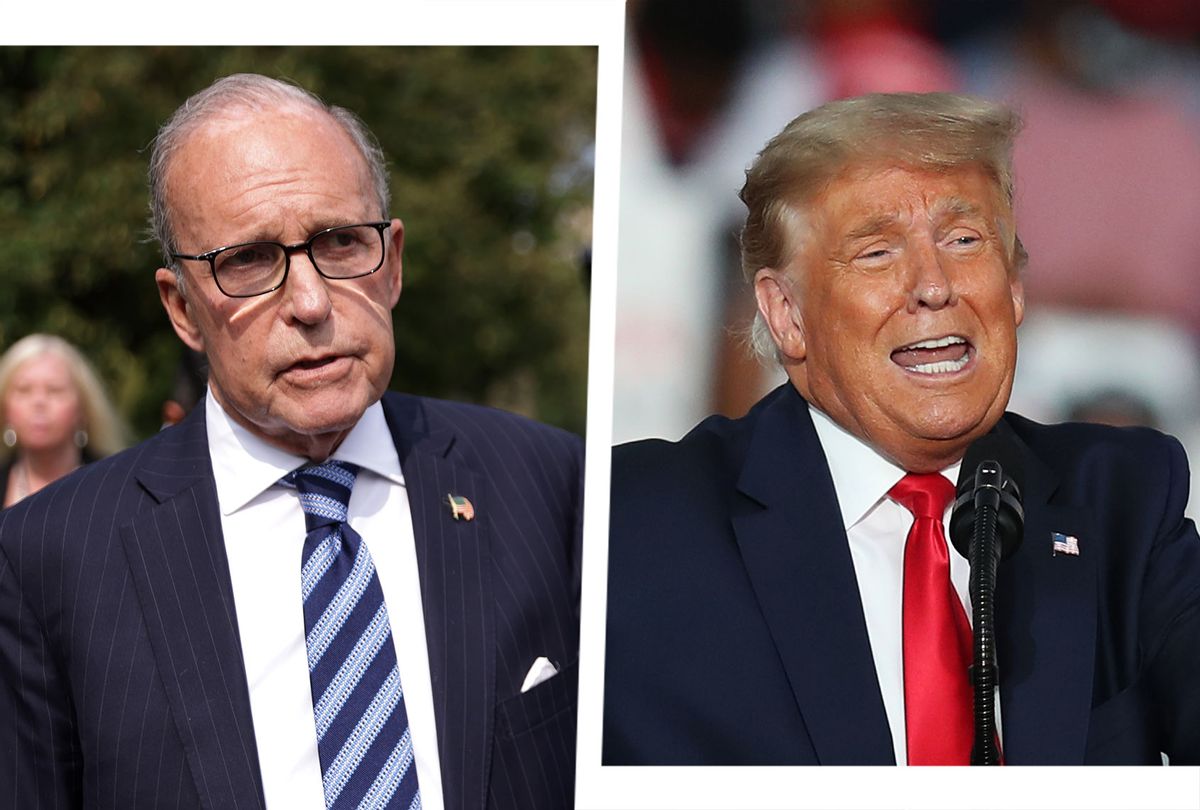The Trump administration publicly downplayed the coronavirus in the early days of the pandemic while giving major Republican donors private warnings. The information helped elite traders "gain financial advantage during a chaotic three days when global markets were teetering," according to The New York Times.
President Donald Trump repeatedly downplayed the threat posed by the virus in February. He claimed on Feb. 24 that it was "very much under control" in the U.S., and the stock market was "starting to look very good to me."
That same day, Trump's economic team privately gave a less optimistic briefing to board members of the Hoover Institution, a conservative think tank whose members often donate to Republican candidates.
Top economic adviser Larry Kudlow also sought to publicly insist that the virus was "contained," and the economy was "holding up nicely" on Feb. 25.
But privately, Kudlow was not as certain in his Hoover presentation later that day, where he was quoted as saying the virus was "contained in the U.S., to date, but now we just don't know."
The private comments were included in a lengthy email by hedge fund consultant William Callanan, who detailed the three-day Hoover event to hedge fund manager and top Republican donor David Tepper before it was distributed it to others.
"What struck me," Callanan wrote, was that nearly all officials brought up the virus "as a point of concern, totally unprovoked."
Kudlow "revised his statement about the virus being contained," he added.
Tomas Philipson, the chairman of Trump's Council of Economic advisers, acknowledged to The Times that he had expressed uncertainty during the private briefing. Kudlow also did not dispute that he had made the comments. The former CNBC anchor told the outlet that he believed his comments were not materially different from his public ones.
"There was never any intent on my part to misinform," he said.
The Hoover Institution, which is led by former Secretary of State Condoleezza Rice, includes board members like Fox News mogul Rupert Murdoch, who did not attend the meeting.
There has also been a revolving door between the think tank and the Trump administration. Joshua Rauh, one of the economists who spoke at the meeting, has since rejoined the institution. Kevin Hassett, who moderated the panel and served as the top White House economist, is now a Hoover Institution fellow. Dr. Scott Atlas, a Hoover fellow who has pushed the discredited "herd immunity" strategy, joined Trump's coronavirus task force in August.
The stock market was already struggling as public health officials publicly contradicted the administration's rosy outlook, but investors "spotted the immediate significance" of the private messaging, according to The Times.
The president's aides appeared to be giving wealthy party donors an early warning of a potentially impactful contagion at a time when Mr. Trump was publicly insisting that the threat was nonexistent.
Some investors stocked up on toilet paper and other essential items before a mad rush caused nationwide shortages, according to The Times. Others decided to "short everything," or bet that certain stocks would fail, to profit from the collapse.
Callanan reportedly sent the email to Tepper, the owner of the Carolina Panthers and the prominent hedge fund Appaloosa Management, detailing the "level of concern" among officials and how "ill-prepared health agencies appeared to combat a pandemic."
The email was circulated throughout the company, and its warnings were shared with other investors, according to the report. Those investors shared it with their own associates. The email was shared between at least four financial firms over 24 hours, on the same day the Dow Jones fell 300 points.
Callanan told The Times that the email was shared "without his knowledge or consent." He claimed that the copy obtained by the outlet was "materially different" than the original one he created, though he would not say how.
Tepper disputed that the email was significant.
"We were in the information flow on COVID at that point," he told The Times. "Because we were so public about this warning, people were calling us at this time.
The report highlights the disconnect between the rosy picture the Trump administration tried to paint to an unprepared public — before panic and supply shortages began — and growing concerns within the administration.
Trump trade adviser Peter Navarro distributed an internal memo on Feb. 23 predicting the coronavirus could kill as many as 2 million Americans.
Trump told Bob Woodward even earlier on Feb. 7 that the virus was airborne and "more deadly than even your strenuous flus," according to the journalist's new book.
Democrats said The Times report showed where the administration's priorities were before the pandemic killed more than 217,000 Americans.
"If this doesn't tell you who they prioritize then I don't know what will," Michigan Democratic Senate leader Jim Ananich said. "People died and he lied."



Shares